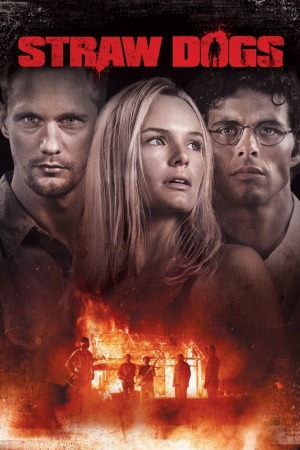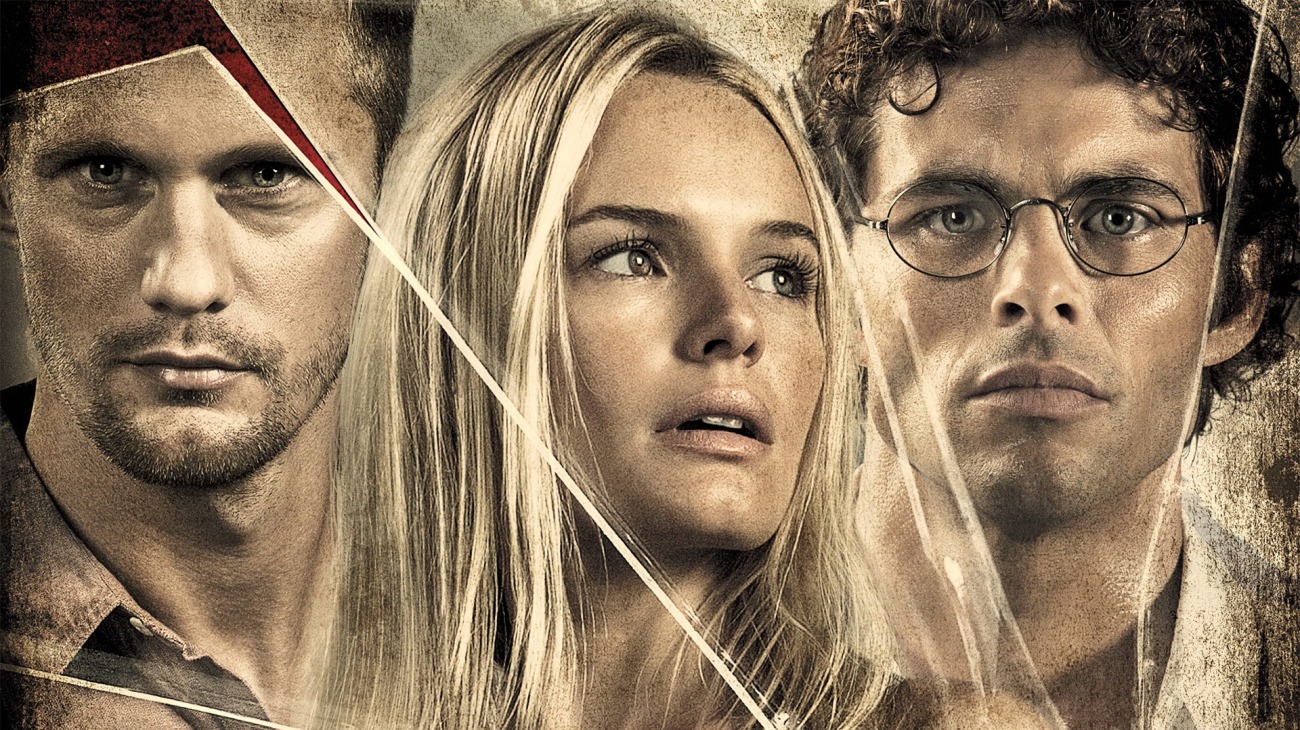
Doggone remakes
There's nothing that's not lazy about the statement "they didn't need to remake X", because the fact of the matter is that they did (or maybe they didn't but then you're just being weird to complain about it), and you can either whine or deal with the thing that now exists. Still and all, they really, absolutely didn't need to remake the 1971 Straw Dogs: 40 years later, cinephile culture is still trying to figure that one out, and it's fair to say that, whereas many films that get remade are famous, Straw Dogs is notorious, and the nature of that notoriety makes it vanishingly unlikely that either the people who love or the people who hate the original would possibly give a damn.
Nevertheless, Rod Lurie has taken it upon himself to write and direct a brand new Straw Dogs for the modern day, replacing Dustin Hoffman with James Marsden, Susan George with Kate Bosworth, and a cozily old-fashioned corner of England with a milquetoast liberal's nightmare version of Mississippi, with rednecks that differ from those in such manifest classics as Two Thousand Maniacs! only insofar as they aren't actual Confederates. The basic plot is much the same: newlyweds David and Amy Sumner return to her childhood home, not entirely to her pleasure. When they arrive, the generally icky behavior of the locals, particularly Amy's ex-boyfriend Charlie (Alexander Skarsgård), who is helping to repair the Sumners' house, starts to put a strain on both members of the marriage, and on their relationship itself; she accuses him of being mewling and ineffectual, because he basically is, and when he tries to prove his manliness by accompany Charlie and some other good ol' boys on a hunting trip, they ditch him in the middle of the woods so that Charlie can sneak back to the Sumner home to rape her. Some days later, for unrelated reasons - in fact, Amy has not even told David of the rape - the couple is besieged by Charlie and his pack, and David proves his masculinity in the most aggressive way possible.
The original film had its controversies - Pauline Kael called it fascist, though she tended to do that a lot - but some of that has calmed down a bit over the decades, and I think most of us can agree that it is a lot more ambivalent about male privilege than the most reductive reading suggests (David is worthless when he is weak and equivocating and draft-dodging; David is a Strong Man when he goes cavemen on the man who raped his woman). Certainly, anybody who thinks that the whirlwind of death and violence that ends the film meets with Peckinpah's unmixed approval is not interested in watching the movie at all. My own take is that the film is essentially defeatist and nihilistic: not taking action and being a pussy girly-man is bad, but being rough and physical is even worse, and basically the whole universe is just all kinds of evil regardless of what you do or don't do.
Naturally, the remake eschews all of that: first by making David's initial flopsiness infinitely less severe (he's now a screenwriter in the country for a while to do away with distractions, not a Vietnam-dodging math professor), so that Amy's turning on him - which happens later - seems much less reasonable. Then, and this is the important part, rather than observing his end-of-film rampage with clinical disgust, Lurie celebrates it, as though this was any run-of-the-mill action sequence against any run-of-the-mill home invaders. Which, in this film, with its wholly unchallenging hero vs. rednecks mentality, it is.
(The other big point of comparison is, of course, the rape scene: easily the most contentious part of the original, given the troubling indication that Amy is, at least somewhat, enjoying herself. I just know you'll be shocked that it's not remotely that way in the remake).
Of course, being infinitely weaker than Straw Dogs '71 isn't really a referendum on Straw Dogs '11; like I said, it exists, and it's best to deal with what exists. But there's not all that much there to exist. Other than its wildly over-the-top treatment of native Mississippians as a pack of thuggish tribalists - James Woods's bug-eyed turn as the insane football coach is a particular treasure - the film doesn't seem to have any ideas but to tread water until the big action scene at the end, and hope that Marsden's incredibly vanilla take on a character who didn't have a whole lot of complexity to him in the first place will be sufficiently compelling to the viewer that the film's tentative stabs at raising tension will work. It comes closer than I've made it sound, mostly because Skarsgård was a damnably lucky bit of casting, and he manages to exude enough oily meanness through his model-like good looks that the character seems genuinely dangerous, even if Marsden and Bosworth aren't so entirely interesting, likable, or believable as human beings that we're terribly invested in whatever happens to them.
Closer, but it still fails: because the Sumners aren't interesting, likable, or believable, two of which adjectives applied to their Peckinpavian counterparts. Besides, while the new film's transition to the South is carried off with generally thorough results - the football material is a nice touch - Lurie's adaptation leaves one howlingly big question: in 1971, Hoffman and George were stuck in that horribly rapey England town because they could not go anywhere else: Marsden and Bosworth are in Blackwater, MS to rebuild her familial home and so he can write in peace, and there is no suggestion that they plan to stay there for keeps. When the 1971 couple was being menaced by hateful locals, there was a sense of dead-end desperation underpinning it: but Marsden and Bosworth, at the first sign of trouble, could easily zip right back to Los Angeles. Once you've let that into your head, any possibility that the new Straw Dogs could really work flies out the window: unsympathetic characters are hard enough to take, but sheer goddamn idiots, now that's just bad filmmaking.
4/10
Nevertheless, Rod Lurie has taken it upon himself to write and direct a brand new Straw Dogs for the modern day, replacing Dustin Hoffman with James Marsden, Susan George with Kate Bosworth, and a cozily old-fashioned corner of England with a milquetoast liberal's nightmare version of Mississippi, with rednecks that differ from those in such manifest classics as Two Thousand Maniacs! only insofar as they aren't actual Confederates. The basic plot is much the same: newlyweds David and Amy Sumner return to her childhood home, not entirely to her pleasure. When they arrive, the generally icky behavior of the locals, particularly Amy's ex-boyfriend Charlie (Alexander Skarsgård), who is helping to repair the Sumners' house, starts to put a strain on both members of the marriage, and on their relationship itself; she accuses him of being mewling and ineffectual, because he basically is, and when he tries to prove his manliness by accompany Charlie and some other good ol' boys on a hunting trip, they ditch him in the middle of the woods so that Charlie can sneak back to the Sumner home to rape her. Some days later, for unrelated reasons - in fact, Amy has not even told David of the rape - the couple is besieged by Charlie and his pack, and David proves his masculinity in the most aggressive way possible.
The original film had its controversies - Pauline Kael called it fascist, though she tended to do that a lot - but some of that has calmed down a bit over the decades, and I think most of us can agree that it is a lot more ambivalent about male privilege than the most reductive reading suggests (David is worthless when he is weak and equivocating and draft-dodging; David is a Strong Man when he goes cavemen on the man who raped his woman). Certainly, anybody who thinks that the whirlwind of death and violence that ends the film meets with Peckinpah's unmixed approval is not interested in watching the movie at all. My own take is that the film is essentially defeatist and nihilistic: not taking action and being a pussy girly-man is bad, but being rough and physical is even worse, and basically the whole universe is just all kinds of evil regardless of what you do or don't do.
Naturally, the remake eschews all of that: first by making David's initial flopsiness infinitely less severe (he's now a screenwriter in the country for a while to do away with distractions, not a Vietnam-dodging math professor), so that Amy's turning on him - which happens later - seems much less reasonable. Then, and this is the important part, rather than observing his end-of-film rampage with clinical disgust, Lurie celebrates it, as though this was any run-of-the-mill action sequence against any run-of-the-mill home invaders. Which, in this film, with its wholly unchallenging hero vs. rednecks mentality, it is.
(The other big point of comparison is, of course, the rape scene: easily the most contentious part of the original, given the troubling indication that Amy is, at least somewhat, enjoying herself. I just know you'll be shocked that it's not remotely that way in the remake).
Of course, being infinitely weaker than Straw Dogs '71 isn't really a referendum on Straw Dogs '11; like I said, it exists, and it's best to deal with what exists. But there's not all that much there to exist. Other than its wildly over-the-top treatment of native Mississippians as a pack of thuggish tribalists - James Woods's bug-eyed turn as the insane football coach is a particular treasure - the film doesn't seem to have any ideas but to tread water until the big action scene at the end, and hope that Marsden's incredibly vanilla take on a character who didn't have a whole lot of complexity to him in the first place will be sufficiently compelling to the viewer that the film's tentative stabs at raising tension will work. It comes closer than I've made it sound, mostly because Skarsgård was a damnably lucky bit of casting, and he manages to exude enough oily meanness through his model-like good looks that the character seems genuinely dangerous, even if Marsden and Bosworth aren't so entirely interesting, likable, or believable as human beings that we're terribly invested in whatever happens to them.
Closer, but it still fails: because the Sumners aren't interesting, likable, or believable, two of which adjectives applied to their Peckinpavian counterparts. Besides, while the new film's transition to the South is carried off with generally thorough results - the football material is a nice touch - Lurie's adaptation leaves one howlingly big question: in 1971, Hoffman and George were stuck in that horribly rapey England town because they could not go anywhere else: Marsden and Bosworth are in Blackwater, MS to rebuild her familial home and so he can write in peace, and there is no suggestion that they plan to stay there for keeps. When the 1971 couple was being menaced by hateful locals, there was a sense of dead-end desperation underpinning it: but Marsden and Bosworth, at the first sign of trouble, could easily zip right back to Los Angeles. Once you've let that into your head, any possibility that the new Straw Dogs could really work flies out the window: unsympathetic characters are hard enough to take, but sheer goddamn idiots, now that's just bad filmmaking.
4/10
Categories: needless remakes, thrillers, violence and gore






